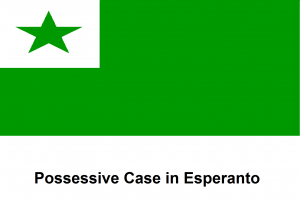Difference between revisions of "Language/Esperanto/Grammar/Possessive-Case-in-Esperanto"
Jump to navigation
Jump to search
m (Quick edit) |
m (Quick edit) |
||
| Line 1: | Line 1: | ||
[[File:Possessive Case in Esperanto.png|alt=Possessive Case in Esperanto|thumb|'''Possessive Case in Esperanto''']] | [[File:Possessive Case in Esperanto.png|alt=Possessive Case in Esperanto|thumb|'''Possessive Case in Esperanto''']] | ||
Hello everybody, | Hello everybody, | ||
| Line 8: | Line 7: | ||
Feel free to edit this page by adding new words and expressions ! | Feel free to edit this page by adding new words and expressions ! | ||
Happy learning ! :) | |||
<span link>After mastering this lesson, these related pages might interest you:</span> [[Language/Esperanto/Grammar/Gender|Gender]], [[Language/Esperanto/Grammar/Negation|Negation]], [[Language/Esperanto/Grammar/Possessive-pronouns|Possessive pronouns]] & [[Language/Esperanto/Grammar/THE-CORRELATIVES|THE CORRELATIVES]]. | |||
== '''Possessive Case in Esperanto''' == | == '''Possessive Case in Esperanto''' == | ||
{| class="wikitable sortable" | {| class="wikitable sortable" | ||
| Line 19: | Line 17: | ||
|'''<big>ENGLISH</big>''' | |'''<big>ENGLISH</big>''' | ||
|'''<big>ESPERANTO</big>''' | |'''<big>ESPERANTO</big>''' | ||
|'''<big>PRONUNCIATION | |'''<big>ENGLISH PRONUNCIATION</big>''' | ||
|'''<big>PORTUGUESE</big>''' | |||
| | |||
'''<big>PORTUGUESE</big>''' | |||
|- | |- | ||
| | | | ||
| Line 150: | Line 146: | ||
|} | |} | ||
== | ==Other Lessons== | ||
* [[Language/Esperanto/Grammar/Comaratives-and-Superlatives|Comaratives and Superlatives]] | * [[Language/Esperanto/Grammar/Comaratives-and-Superlatives|Comaratives and Superlatives]] | ||
* [[Language/Esperanto/Grammar/Verbs|Verbs]] | * [[Language/Esperanto/Grammar/Verbs|Verbs]] | ||
| Line 160: | Line 156: | ||
* [[Language/Esperanto/Grammar/PREPOSITIONS|PREPOSITIONS]] | * [[Language/Esperanto/Grammar/PREPOSITIONS|PREPOSITIONS]] | ||
* [[Language/Esperanto/Grammar/CONJUNCTIONS|CONJUNCTIONS]] | * [[Language/Esperanto/Grammar/CONJUNCTIONS|CONJUNCTIONS]] | ||
<span links></span> | |||
Latest revision as of 11:03, 27 March 2023
Hello everybody,
In today's lesson you will learn some useful vocabulary about ¨POSSESSIVE CASE¨ in Esperanto
Feel free to edit this page by adding new words and expressions !
Happy learning ! :)
After mastering this lesson, these related pages might interest you: Gender, Negation, Possessive pronouns & THE CORRELATIVES.
Possessive Case in Esperanto[edit | edit source]
| ENGLISH | ESPERANTO | ENGLISH PRONUNCIATION | PORTUGUESE |
| My ... (masc) / | Mia ... (masc) / | myah | Meu |
| My ... (femin) | Mia ... (femin) | myah | Minha |
| My ... (mas pl) | Mia ... (mas pl) | myah | Meus |
| My ... (femin pl) | Mia ... (femin pl) | myah | Minhas |
| Your ... (masc) | Via ... (masc) | vyah | Seu |
| Your ... (femin) | Via ... (femin) | vyah | Sua |
| Your ... (masc pl) | Via ... (masc pl) | vyah | Seus |
| Your ... (femin pl) | Via ... (femin pl) | vyah | Suas |
| His ... | Lia ... | lyah | ... dele |
| Her... | Ŝia... | shyah | ... dela |
| Our ... (masc) | Nia ... (masc) | nyah | Nosso |
| Our ... (femin) | Nia ... (femin) | nyah | Nossa |
| Our ... (masc pl) | Nia ... (masc pl) | nyah | Nossos |
| Our ... (femin pl) | Nia ... (femin pl) | nyah | Nossas |
| Your ... (polite) | Via ... (formal) | vyah | ... de vocês |
| Your ... (polite) | Via ... (formal) | vyah | ... de vocês |
| Their ... (m) | Ilia ... (masc) | ih lyah | ... deles |
| Their ... (f) | Ilia ... (femin) | ih lyah | ... delas |
Other Lessons[edit | edit source]
- Comaratives and Superlatives
- Verbs
- Gender
- Plural
- THE ACCUSATIVE
- Pronouns
- ADVERBS
- PREPOSITIONS
- CONJUNCTIONS
